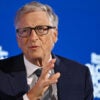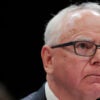President Barack Obama’s second address to the United Nations General Assembly almost sounded as if he were speaking to voters on the campaign trail in Iowa, instead of fawning diplomats in Manhattan. He mentioned his financial reform, his commitment to fighting global warming, his efforts to withdrawal from Afghanistan and his new nuclear treaty with Russia. In classic Obama form, he mentioned the words “I,” “me” or “my” 34 times, including this line about his efforts to stop Iran’s nuclear weapons program: “Now let me be clear once more: The United States and the international community seek a resolution to our differences with Iran, and the door remains open to diplomacy should Iran choose to walk through it.” As Iranian President Mahmoud Ahmadinejad’s speech just hours later would show, President Obama is gonna be waiting a long time.
After kicking off with some brief remarks on the “failure” of “the system of Capitalism,” Ahmadinejad then turned to 9/11, which he said “has affected the whole world for almost a decade.” Ahmadinejad identified “those responsible for the attack” as “some segments within the U.S. government orchestrated the attack to reverse the declining American economy and its grips on the Middle East in order also to save the Zionist regime. The majority of the American people as well as other nations and politicians agree with this view.” At that point, to their credit, President Obama’s U.N. delegation had the decency to walkout. But the Obama administration then turned right around and affirmed their engagement strategy: “We didn’t offer engagement with Iran because we agree with what Ahmadinejad says,” said State Department spokesman P.J. Crowley. “We have offered engagement with Iran because we think it’s in our national security interest.”
But now even some former Obama administration officials are beginning to doubt their faith in Obama’s foreign policy vision. Last Sunday, former Obama State Department official Ray Takeyh wrote in The Washington Post: “The essence of Washington’s approach is that confronted with a choice of debilitating isolation or rejoining the community of nations, Iran will eventually make the ‘right’ decision. The Islamic Republic, however, is too wedded to its ideological verities and too subsumed by its rivalries to engage in such judicious determinations.”
But the failure of President Obama’s nuclear disarmament strategy is not limited to Tehran. Heritage Foundation analyst Theodore Bromund explains:
The underlying assumption of the President’s statement is that the General Assembly in particular, and the United Nations in general, plays a central role in arms control and disarmament. This is not true. The Security Council has an important, but qualified and limited, role to play in pursuit of international peace and security.
The United Nations as a whole, as Heritage Foundation analyst Baker Spring points out, is profoundly handicapped by its assumption of moral equivalence between democracies and dictatorships, by its refusal to fully acknowledge the inherent right of self-defense, by its insistence on negotiating unverifiable and unenforceable treaties, and by its desire to supplant the authority of sovereign nation states with that of U.N. bureaucrats and unaccountable NGOs.
President Obama’s devotion to international institutions like the United Nations is the core of the Obama Doctrine. But as Bromund alludes to above, the President’s failure to acknowledge both the limitations and shortcomings of the United Nations allows other countries to abuse his goodwill for their own purposes. The United Nations finds no moral conflict in having human rights abusers sit on the U.N. Human Rights Council; in having socialist countries sit on the United Nations’ Economic and Social Council; or having terrorism-sponsoring nations block the United Nations from defining an act of terrorism.
President Obama did throw one sentence toward making “this institution more accountable,” but no specific agenda was broached or referenced, which is not surprising since Obama has failed to even nominate a U.S. Representative for Management and Reform to the United Nations. The President did call on other countries to “bring specific commitments to promote transparency; to fight corruption.” But if the U.S. administration isn’t willing to fight for those reforms in the United Nations, what are the odds that other governments will be willing to offer them up for their own countries? We’re not holding our breath.
Quick Hits:
- Spooked by protests from vulnerable incumbents, Democrats have abandoned plans to raise taxes before Election Day.
- Fresh data released this week shows weakness in the housing sector still poses risks to the fragile economic recovery.
- The official Chinese news agency Xinhua said four Japanese citizens have been arrested for videotaping military installations.
- Former General Electric CEO Jack Welch told CNBC yesterday that the Obama administration has an “anti-business” bias which manifests itself through intimidation, trade, taxes and regulation.
- The Democrats have invited actor Stephen Colbert to testify before Congress in fictional character.































40 Replies to “Morning Bell: Waiting for Crazy”